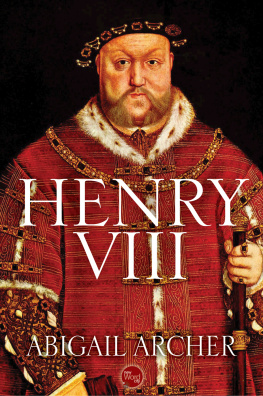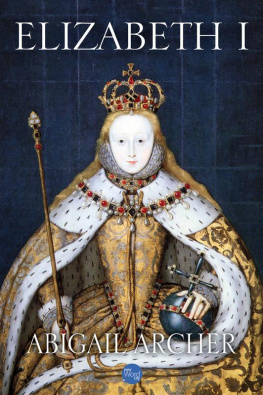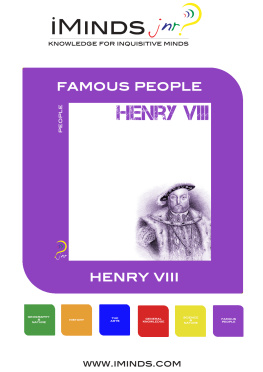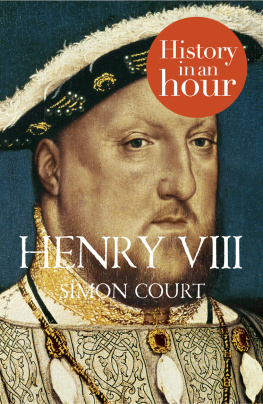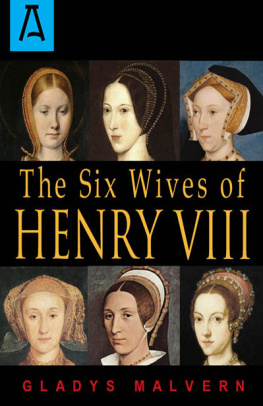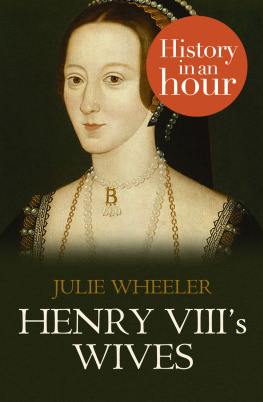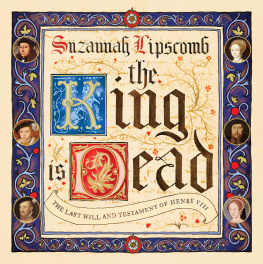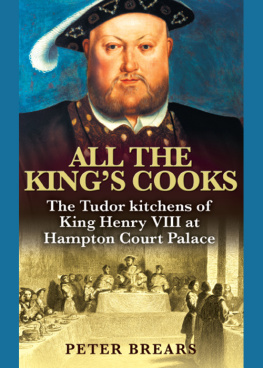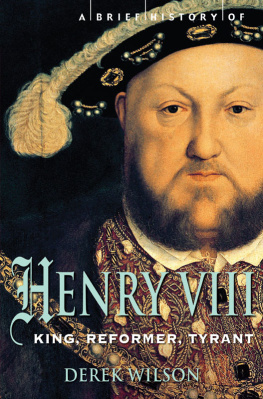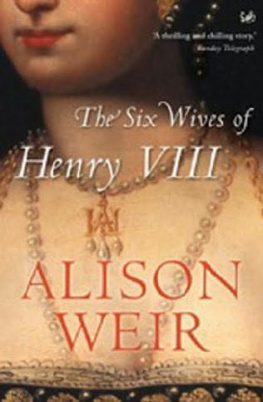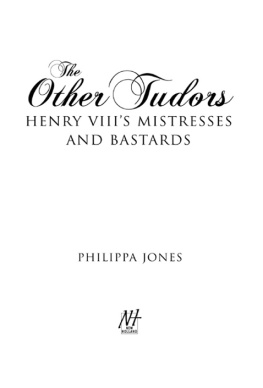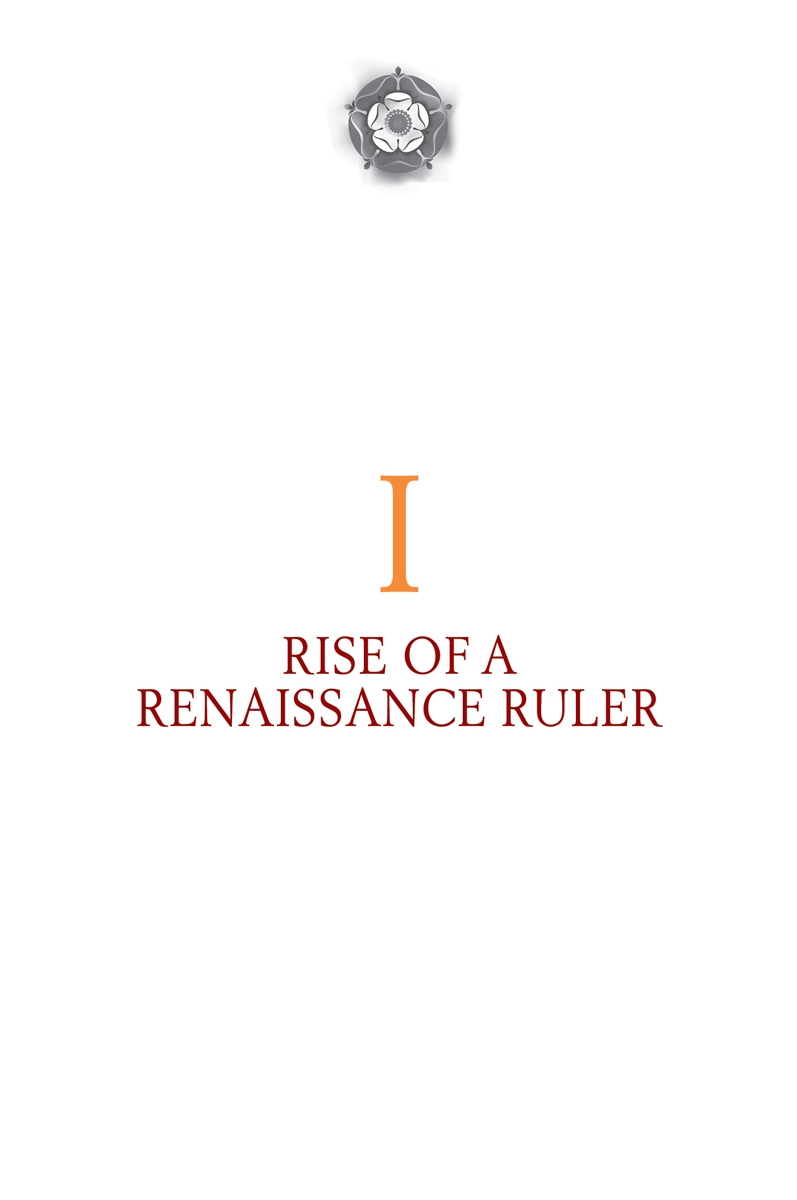HENRY VIII HAS come down in history as a bloody tyrant, reckless and headstrong, a man who put his country at risk for his sexual appetite, and in many respects, he fit that description. But he was also a warrior, a diplomat who maintained Englands balance in a time of rapidly shifting alliances, and a man of exquisite taste, refined manners, and considerable learning and culture. The evidence of his many affairs is plentiful, but also fragmentary, since he was far more reserved than legend would have it. His multiple palaces and lavish lifestyle were deliberately calculated to enhance the prestige of the English monarchy, and few kings have ever gathered around them so many talented and glittering personalities.
Henry VIII was a Renaissance ruler, presiding over one of Europes greatest courts at one of historys most creative times. When the papal nuncio Francesco Chieregato arrived in London in 1517, he was overwhelmed by the magnificence of the Tudor Court. The wealth and civilization of the world are here, he wrote, and those who call the English barbarians appear to me to render themselves such. I here perceive very elegant manners, extreme decorum and great politeness, and amongst other things there is this invincible king, whose acquirements and qualities are so many and excellent, that I consider him to excel all who ever wore a crown.
HE WASNT BORN a prince. Henry VIII came to the throne because his father, Henry VII , seized it on the battlefield, defeating King Richard III at the Battle of Bosworth Field in 1485. Henry VII had only a distant claim to the crown; born Henry Tudor in 1457, a member of Welsh nobility, he was descended through his mother from the royal House of Lancaster , whose heraldic symbol was a red rose. The family had been battling for the throne for thirty years with the rival House of York , which used a white rose as its emblem. Henry VIIs mother, Margaret Beaufort , ended the Wars of the Roses by arranging a strategic marriage for her son to Elizabeth of York , the daughter of King Edward IV , thus uniting the rival clans.
Henry Tudor never knew his father, who died of the plague three months before he was born. But his mother was instrumental in his rise to power. Ambitious, strong-willed, and politically astute, she arranged for the boys uncle to take him to live in Brittany to keep him safe after King Henry VI was murdered and his son Edward died in battle in 1471. She arranged his betrothal to Elizabeth and forged an alliance with the Yorks. But after the Yorkist Richard III was crowned in 1483, she used the new kings unpopularity to incite an uprising in support of her son, and Henry and his uncle sailed from France to battle Richard and claim the throne.
As king, Henry VII shrewdly bolstered his title, promptly marrying Elizabeth and establishing the heraldic Tudor rose , a combination of the white rose of York and the red rose of Lancaster. He built up the royal treasury and made peace with France. He and Elizabeth had seven children, three of whom died at birth or in infancy; Henry named his older son Arthur , evoking the legendary English king , and married him at the age of fifteen to Catherine of Aragon , cementing an alliance with her father, Ferdinand II of Spain. After making peace with James IV of Scotland, Henry sent his older daughter Margaret to be the Scottish queen.
The kings second son, born on June 28, 1491, and also named Henry, was treated as a sort of royal insurance policy a spare heir, in the unlikely event his older brother Arthur wasnt alive when the king died. Although his grandmother had recorded the births of Arthur and Margaret in great detail in her Bible, she barely mentioned Henrys arrival. (A second daughter, Mary, was born five years later to similar brief notices.) Nonetheless, he was treated like a prince, anointed with oil and wrapped in blue velvet and cloth of gold in his cradle. And just weeks after his christening, the formidable Margaret Beaufort, his paternal grandmother, took custody of the infant. He would learn to fear and love her in equal parts.
Henry spent his early childhood at the Palace of Placentia , now known as Greenwich, on the bank of the Thames five miles from London. It was set in a large park, and he grew to love it, returning to it repeatedly even though he could choose among many elegant homes. In infancy, the boy was cared for by four rockers and a wet nurse, Anne Luke. Their close relationship lasted past his weaning; when he ascended the throne, Henry gave Anne Luke an annual pension of twenty pounds in gratitude for her care.
Henry was twelve months old when he was given his first official title, Warden of the Cinque Ports. By the time he was three, he was Warden of Scottish Marshes, a Knight of the Bath, and a Knight of the Garter and Duke of York. At that point, his education began, and he acquired his own household. In the years that followed, he was to see little of either his father, who was preoccupied with keeping his hold on the throne and disposing of enemies both inside and outside the kingdom, or his brother, a sickly boy five years his elder who also had his own palace and household staff.
The great force in Henrys early life and the country itself was Margaret Beaufort. She had much greater influence on her son than his mother Elizabeth, and her household easily matched the kings in splendor. Her appetite for power and wealth was combined with genuine piety: Her beautifully tailored gowns, although adorned with magnificent jewelry, were a habit-like black, and her portraits often show her reading devotional books. A woman of intellect and learning, she endowed religious houses and took an interest in theology, religious art, and technology (she was a patron of the then-revolutionary printing industry). Beaufort inspired both awe and fear with her moral and political authority; she used the royal coat of arms and appeared at the kings side at royal events.
Beauforts confessor and closest adviser was John Fisher , vice chancellor of Cambridge University, one of the foremost scholars of the day and a practitioner of Renaissance classicism, which sought out original Greek and Hebrew Biblical texts rather than relying on existing translations. She consulted Fisher when it was time to choose tutors for the royal children, and for Henry he recommended a young, able poet and scholar, John Skelton , a moral and religious purist. Skelton was to teach the boy to be conscious of the artificiality and false values of the Court in contrast to the world outside.
Beaufort was not alone in her determination to have the children raised by preeminent scholars. Henry VII had spent his formative years on the Continent in the early days of the Renaissance, and he wanted England to shed its image of boorishness and cultural backwardness. So he and the queen, hoping to establish their offspring as a new English royal dynasty, welcomed their early education by the best minds available.
When Henry VII seized the throne, he brought to the Royal Court a number of new men, counselors whose chief function was to reinforce the kings position. As is often true with strong rulers, Henry was both respected and resented for his firm grasp of power and politics. The heavy taxes needed to support his battles with enemies inside and outside the kingdom incensed the public. Young Henry was only five, two years into Skeltons tutorship, when the men of Cornwall rose in rebellion against Henry VIIs taxes and marched to overthrow him. As the rebel army approached, the boy was staying with Margaret Beaufort at her palace at Coldharbour. Beaufort gathered the queen and her children and sent them on barges to the safety of the Tower of London .

